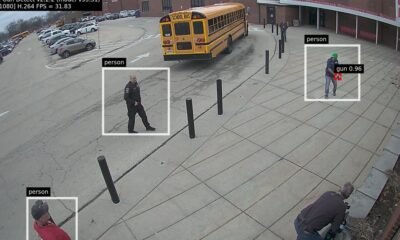AI Research
AI grading issue affects hundreds of MCAS essays in Mass. – NBC Boston
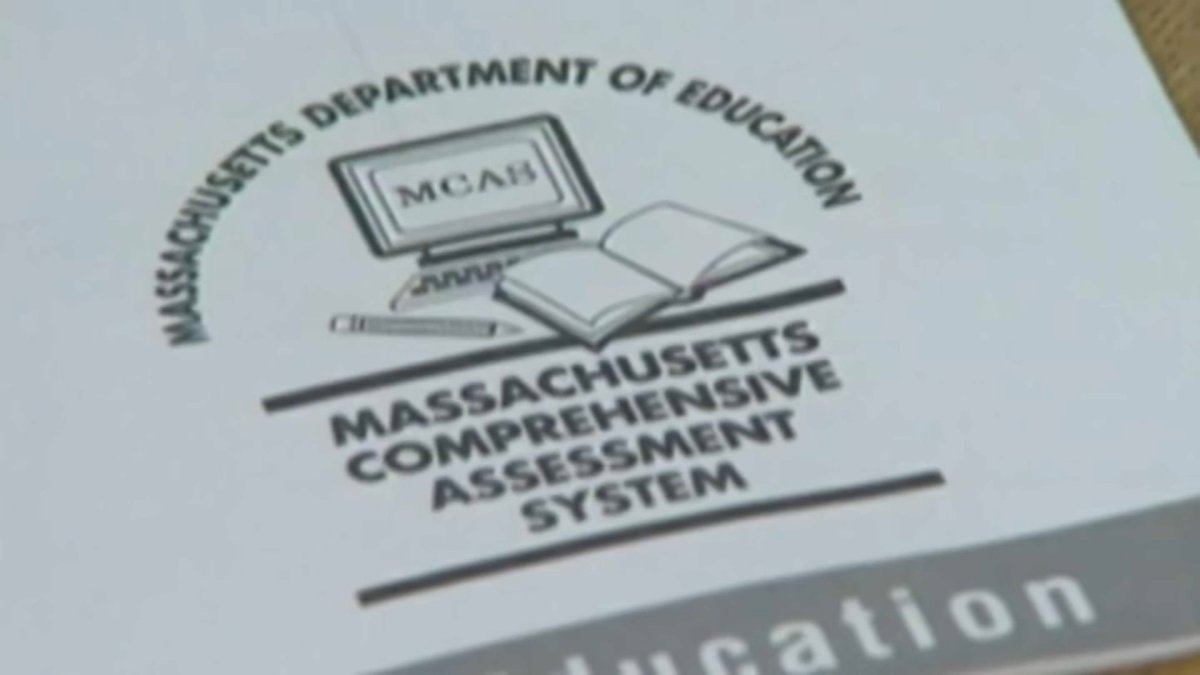
The use of artificial intelligence to score statewide standardized tests resulted in errors that affected hundreds of exams, the NBC10 Investigators have learned.
The issue with the Massachusetts Comprehensive Assessment System (MCAS) surfaced over the summer, when preliminary results for the exams were distributed to districts.
The state’s testing contractor, Cognia, found roughly 1,400 essays did not receive the correct scores, according to a spokesperson with the Department of Elementary and Secondary Education.
DESE told NBC10 Boston all the essays were rescored, affected districts received notification, and all their data was corrected in August.
So how did humans detect the problem?
We found one example in Lowell. Turns out an alert teacher at Reilly Elementary School was reading through her third-grade students’ essays over the summer. When the instructor looked up the scores some of the students received, something did not add up.
The teacher notified the school principal, who then flagged the issue with district leaders.
“We were on alert that there could be a learning curve with AI,” said Wendy Crocker-Roberge, an assistant superintendent in the Lowell school district.
AI essay scoring works by using human-scored exemplars of what essays at each score point look like, according to DESE.
DESE pointed out the affected exams represent a small percentage of the roughly 750,000 MCAS essays statewide.
The AI tool uses that information to score the essays. In addition, humans give 10% of the AI-scored essays a second read and compare their scores with the AI score to make sure there aren’t discrepancies. AI scoring was used for the same amount of essays in 2025 as in 2024, DESE said.
Crocker-Roberge said she decided to read about 1,000 essays in Lowell, but it was tough to pinpoint the exact reason some students did not receive proper credit.
However, it was clear the AI technology was deducting points without justification. For instance, Crocker-Roberge said she noticed that some essays lost a point when they did not use quotation marks when referencing a passage from the reading excerpt.
“We could not understand why an individual score was scored a zero when it should have gotten six out of seven points,” Crocker-Roberge said. “There just wasn’t any rhyme or reason to that.”
District leaders notified DESE about the problem, which resulted in approximately 1,400 essays being rescored. The state agency says the scoring problem was the result of a “temporary technical issue in the process.”
According to DESE, 145 districts were notified that had at least one student essay that was not scored correctly.
“As one way of checking that MCAS scores are accurate, DESE releases preliminary MCAS results to districts and gives them time to report any issues during a discrepancy period each year,” a DESE spokesperson wrote in a statement.
Mary Tamer, the executive director of MassPotential, an organization that advocates for educational improvement, said there are a lot of positives to using AI and returning scores back to school districts faster so appropriate action can be taken. For instance, test results can help identify a child in need of intervention or highlight a lesson plan for a teacher that did not seem to resonate with students.
“I think there’s a lot of benefits that outweigh the risks,” said Tamer. “But again, no system is perfect and that’s true for AI. The work always has to be doublechecked.”
DESE pointed out the affected exams represent a small percentage of the roughly 750,000 MCAS essays statewide.
However, in districts like Lowell, there are certain schools tracked by DESE to ensure progress is being made and performance standards are met.
That’s why Crocker-Roberge said every score counts.
With MCAS results expected to be released to parents in the coming weeks, the assistant superintendent is encouraging other districts to do a deep dive on their student essays to make sure they don’t notice any scoring discrepancies.
“I think we have to always proceed with caution when we’re introducing new tools and techniques,” Crocker-Roberge said. “Artificial intelligence is just a really new learning curve for everyone, so proceed with caution.”
There’s a new major push for AI training in the Bay State, where educators are getting savvier by the second. NBC10 Boston education reporter Lauren Melendez has the full story.
AI Research
Artificial intelligence is at the forefront of educational discussions
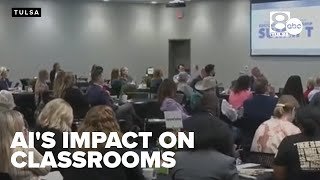
Artificial intelligence is at the forefront of educational discussions as school leaders, teachers, and business professionals gathered at the Education Leadership Summit in Tulsa to explore AI’s impact on classrooms and its implications for students’ futures.
Source: Youtube
AI Research
AI-driven nuclear power revival among 5 takeaways from Pittsburgh summit • Pennsylvania Capital-Star
The push for artificial intelligence-related investments in Western Pennsylvania continued Thursday with a second conference that brought together business leaders and elected officials.
Not in attendance this time was President Donald Trump, who headlined a July 15 celebration of AI opportunity at Carnegie Mellon University.
This time Gov. Josh Shapiro, U.S. Sen. David McCormick and others converged in Bakery Square in Larimer to emphasize emerging public-private initiatives in anticipation of growing data center development and other artificial intelligence-related infrastructure including power plants.
Here’s what speakers and attendees at the summit were saying.
AI is not a fad
As regional leaders and business investors consider their options, BNY Mellon’s CEO Robin Vince cautioned against not taking AI seriously.
“The way to get left behind in the next 10 years is to not care about AI,” Vince said
“AI is transforming everything,” said Selin Song during Thursday’s event. As president of Google Customer Solutions, Song said that the company’s recent investment of $25 million across the Pennsylvania-Jersey-Maryland grid will help give AI training access to the more than 1 million small businesses in the state.
Google isn’t the only game in town
Shapiro noted that Amazon recently announced plans to spend at least $20 billion to establish multiple high-tech cloud computing and AI innovation campuses across the state.
“This is a generational change,” Shapiro said, calling it the largest private sector investment in Pennsylvania’s history. “This is our next chapter in innovative growth. It all fits together. This new investment is beyond data center 1.0 that we saw in Virginia.”
Fracking concerns elevated
With all of the plans for new power-hungry data centers, some are concerned that the AI push will create more environmental destruction. Outside the summit, Food & Water Watch Pennsylvania cautioned that the interest in AI development is a “Trojan horse” for more natural gas fracking. Amid President Donald Trump’s attempts to dismantle wind and solar power, alternatives to natural gas appear limited.
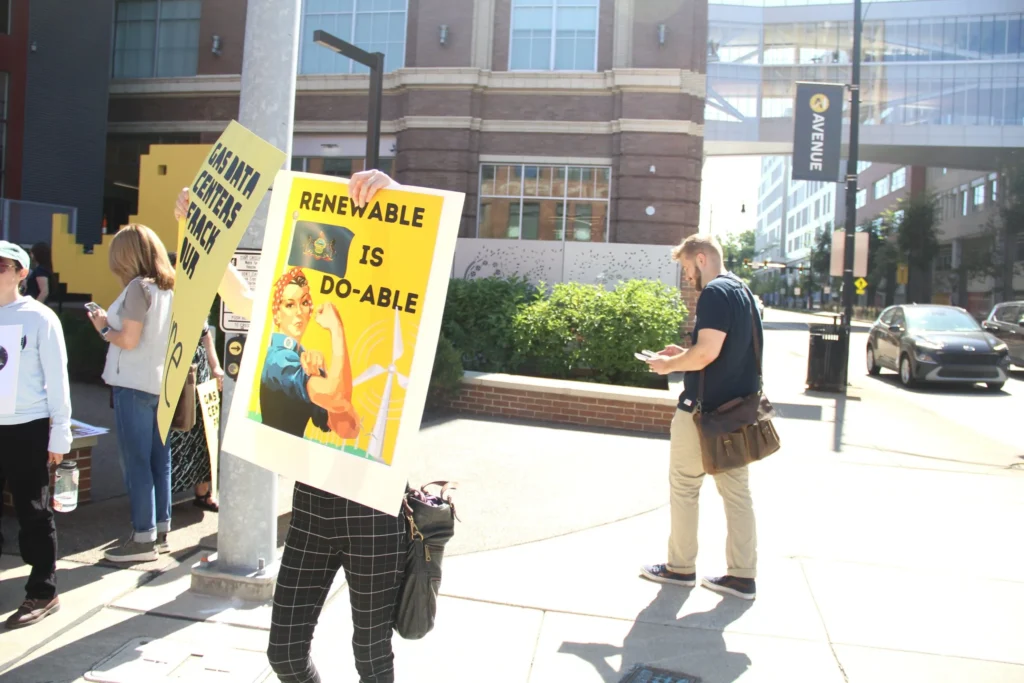
Nuclear ready for its moment
But one possible alternative was raised at the AI conference by Westinghouse Electric Company’s interim CEO Dan Summer.
The Pittsburgh-headquartered organization is leading a renewed interest in nuclear energy with plans to build a number of its AP 1000 reactors to help match energy needs and capabilities.
Summer said that the company is partnering with Google, allowing them to leverage Google’s AI capabilities “with our nuclear operations to construct new nuclear here.”
China vs. ‘heroes’
Underlying much of the AI activity: concerns with China’s work in this field
“With its vast resources, enormous capital, energy, workforce, the Chinese government is leveraging its resources to beat the United States in AI development,” said Nazak Nikakhtar, a national security and international trade attorney who chaired one of the panels Thursday.

Speaking to EQT’s CEO Toby Rice and Groq executive Ian Andrews, Nikakhtar outlined some of the challenges she saw in U.S. development of AI technology compared to China.
“We are attempting to leverage, now, our own resources, albeit in some respects much more limited vis-a-vis what China has, to accelerate AI leadership here in the United States and beat China,” she said. “But we’re somewhat constrained by the resources we have, by our population, by workforce, capital.”
Rice said in response that the natural resources his company is extracting will help power the country’s ability to compete with China.
Rice drew a link between the 9/11 terror attacks 24 years earlier and the “urgency” of competing with China in AI.
“People are looking to take down American economies,” Rice said. “And we have heroes. Never forget. And I do believe that us winning this race against China in AI is going to be one of the most heroic things we’re going to do.”
Eric Jankiewicz is PublicSource’s economic development reporter and can be reached at [email protected] or on Twitter @ericjankiewicz.
AI Research
Kennesaw State secures NSF grants to build community of AI educators nationwide
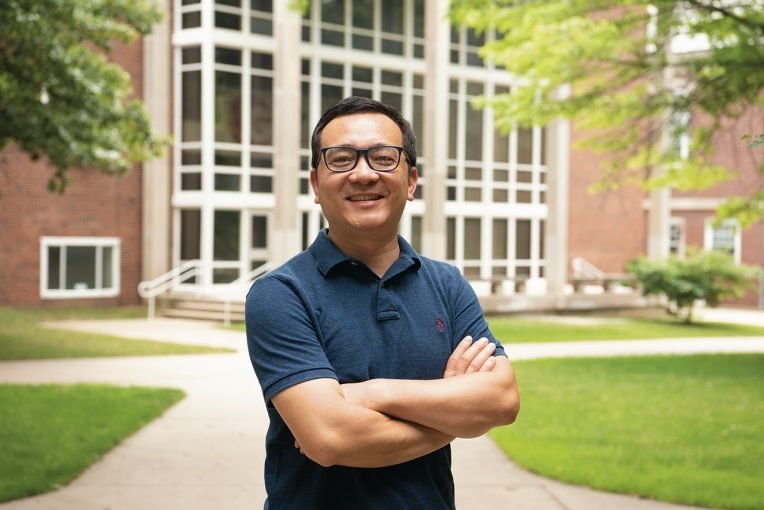
KENNESAW, Ga. |
Sep 12, 2025
The International Data Corporation projects that artificial intelligence will add
$19.9 trillion to the global economy by 2030, yet educators are still defining how
students should learn to use the technology responsibly.
To better equip AI educators and to foster a sense of community among those in the
field, Kennesaw State University Department Chair and Professor of Information Technology (IT) Shaoen Wu, along with assistant professors Seyedamin Pouriyeh and Chloe “Yixin” Xie, were recently awarded two National Science Foundation (NSF) grants. The awards, managed by the NSF’s Computer and Information Science and Engineering division, will fund the project through May 31, 2027 with an overarching goal to unite educators from across the country
to build shared resources, foster collaboration, and lay the foundation for common
guidelines in AI education.
Wu, who works in Kennesaw State’s College of Computing and Software Engineering (CCSE), explained that while many universities, including KSU, have launched undergraduate
and graduate programs in artificial intelligence, there is no established community
to unify these efforts.
“AI has become the next big thing after the internet,” Wu said. “But we do not yet have a mature, coordinated community for AI education. This project is the first step toward building that national network.”
Drawing inspiration from the cybersecurity education community, which has long benefited
from standardized curriculum guidelines, Wu envisions a similar structure for AI.
The goal is to reduce barriers for under-resourced institutions, such as community
colleges, by giving them free access to shared teaching materials and best practices.
The projects are part of the National AI Research Resource (NAIRR) pilot, a White
House initiative to broaden AI access and innovation. Through the grants, Wu and his
team will bring together educators from two-year colleges, four-year institutions,
research-intensive universities, and Historically Black Colleges and Universities
to identify gaps and outline recommendations for AI education.
“This is not just for computing majors,” Wu said. “AI touches health, finance, engineering, and so many other fields. What we build now will shape AI education not only in higher education but also in K-12 schools and for the general public.”
For Wu, the NSF grants represent more than just funding. It validates KSU’s growing presence in national conversations on emerging technologies. Recently, he was invited to moderate a panel at the Computing Research Association’s annual computing academic leadership summit, where department chairs and deans from across the country gathered to discuss AI education.
“These grants position KSU alongside institutions like the University of Illinois Urbana-Champaign and the University of Pennsylvania as co-leaders in shaping the future of AI education,” Wu said. “It is a golden opportunity to elevate our university to national and even global prominence.”
CCSE Interim Dean Yiming Ji said Wu’s leadership reflects CCSE’s commitment to both innovation and accessibility.
“This NSF grant is not just an achievement for Dr. Wu but for the entire College of Computing and Software Engineering,” Ji said. “It highlights our faculty’s work to shape national conversations in AI education while ensuring that students from all backgrounds, including those at under-resourced institutions, can benefit from shared knowledge and opportunities.”
– Story by Raynard Churchwell
Related Stories
A leader in innovative teaching and learning, Kennesaw State University offers undergraduate, graduate, and doctoral degrees to its more than 47,000 students. Kennesaw State is a member of the University System of Georgia with 11 academic colleges. The university’s vibrant campus culture, diverse population, strong global ties, and entrepreneurial spirit draw students from throughout the country and the world. Kennesaw State is a Carnegie-designated doctoral research institution (R2), placing it among an elite group of only 8 percent of U.S. colleges and universities with an R1 or R2 status. For more information, visit kennesaw.edu.
-

 Business2 weeks ago
Business2 weeks agoThe Guardian view on Trump and the Fed: independence is no substitute for accountability | Editorial
-
Tools & Platforms1 month ago
Building Trust in Military AI Starts with Opening the Black Box – War on the Rocks
-

 Ethics & Policy2 months ago
Ethics & Policy2 months agoSDAIA Supports Saudi Arabia’s Leadership in Shaping Global AI Ethics, Policy, and Research – وكالة الأنباء السعودية
-

 Events & Conferences4 months ago
Events & Conferences4 months agoJourney to 1000 models: Scaling Instagram’s recommendation system
-

 Jobs & Careers2 months ago
Jobs & Careers2 months agoMumbai-based Perplexity Alternative Has 60k+ Users Without Funding
-

 Podcasts & Talks2 months ago
Podcasts & Talks2 months agoHappy 4th of July! 🎆 Made with Veo 3 in Gemini
-

 Education2 months ago
Education2 months agoVEX Robotics launches AI-powered classroom robotics system
-

 Education2 months ago
Education2 months agoMacron says UK and France have duty to tackle illegal migration ‘with humanity, solidarity and firmness’ – UK politics live | Politics
-

 Funding & Business2 months ago
Funding & Business2 months agoKayak and Expedia race to build AI travel agents that turn social posts into itineraries
-

 Podcasts & Talks2 months ago
Podcasts & Talks2 months agoOpenAI 🤝 @teamganassi


